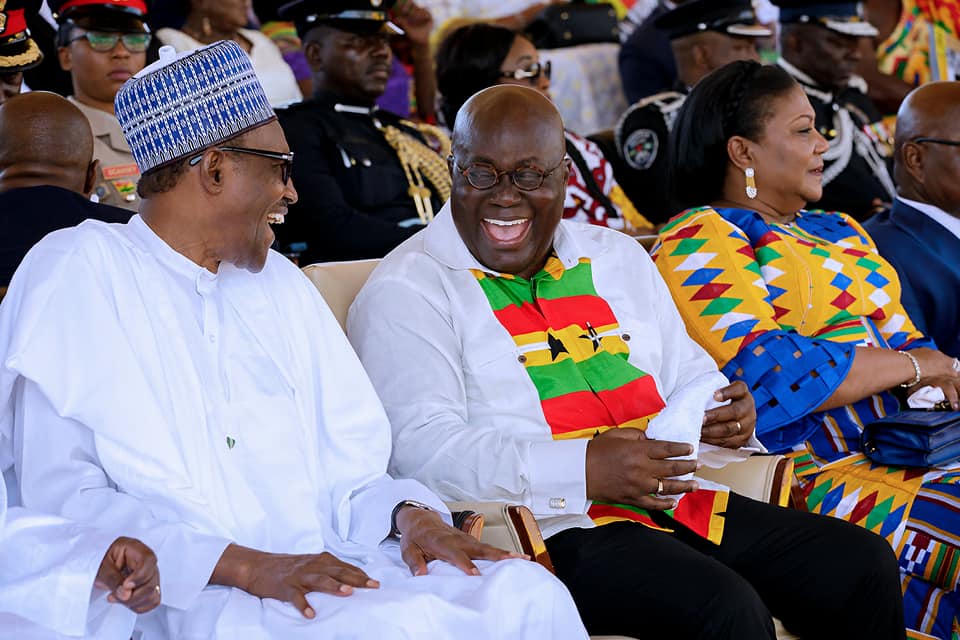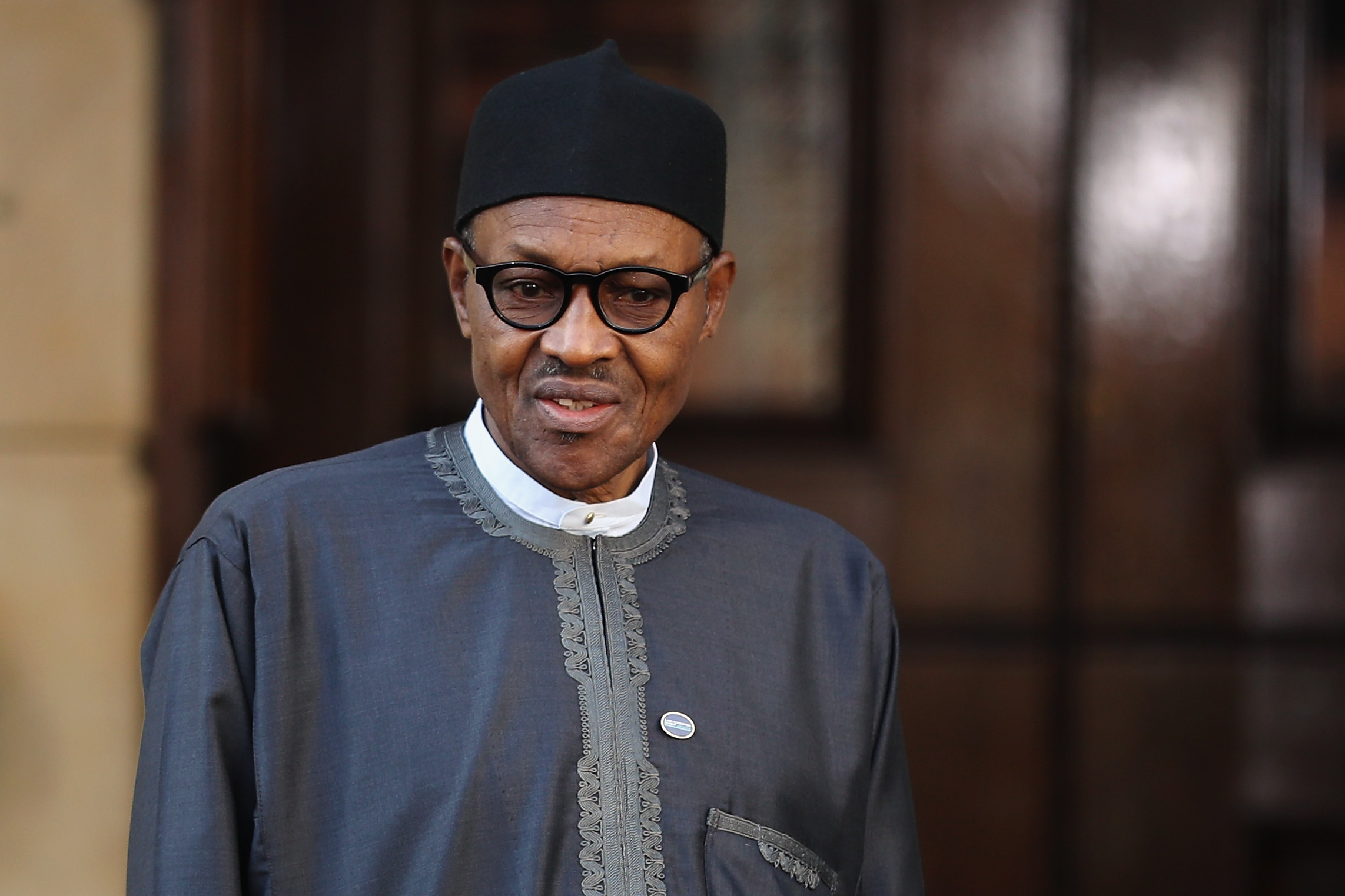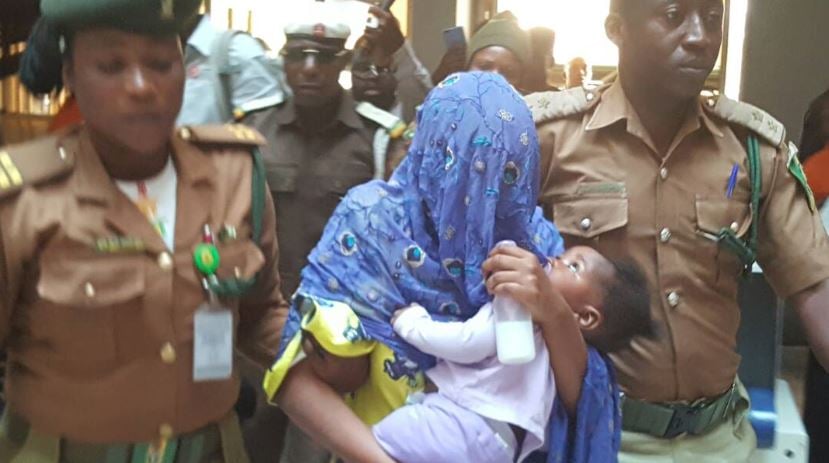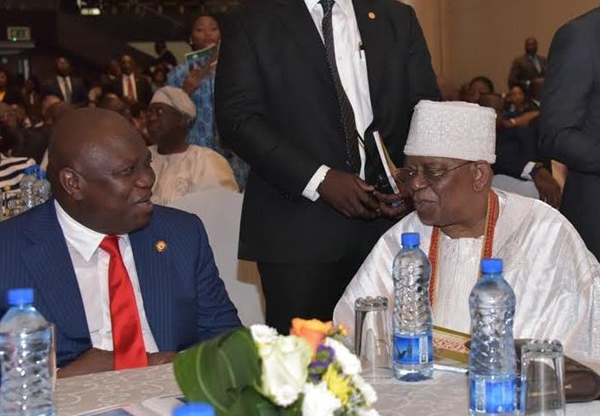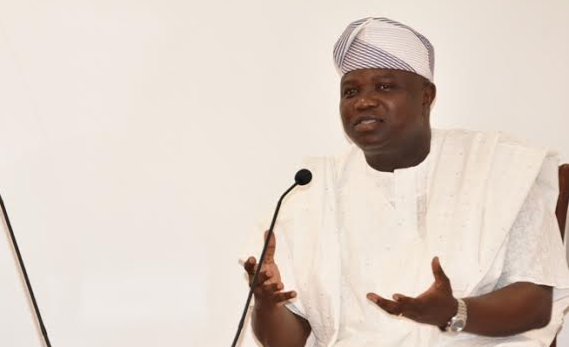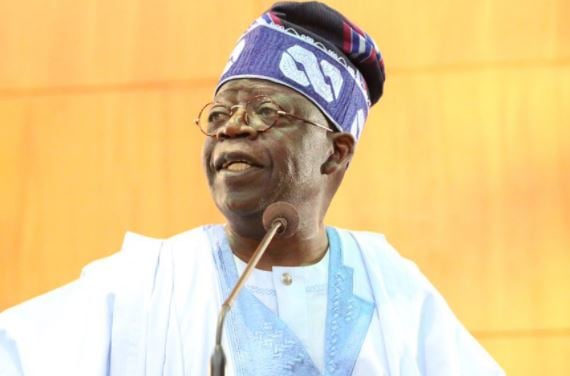In Ghana during the week that just ended, Nigeria’s President, Muhammadu Buhari, acted the script of late Ghanaian playwright, director, children’s author, poet and dramatist, Efua Theodora Sutherland’s The Marriage of Anansewa, to the delight of the crew, Production Director and the benumbed audience. His performance of the legendary drama was so scintillating that Buhari may get a medal, with a probable recommendation that he should be nominated for a Nobel! It was at Ghana’s 61st anniversary and the venue was the Independence Square in Accra.
Invited by the Ghanaian President Nana Akufo-Addo as special guest, President Buhari beautifully advertised the gravamen of Sutherland’s evergreen work, to the mocking delight of Ghanaians and other African countries who, no thanks to the global village of the social media, could access how the Nigerian leader conveniently played the fool that was Mr. George K. Anansewa in the book under consideration.
If you want to properly appreciate The Marriage of Anansewa, look at it from a superficial level. What you will see is a well-crafted drama conveyed as a rich folk tale and garnished with amusing scenes of tradition. Indeed, the book’s thematic rendition is the politics of the bride token, otherwise known as the bride price and the pervasive consumerism that goes with it in African traditional society. The gist of the book is that, Mr. Ananse, in the bid to blackmail his 20-year old daughter, Anansewa who has been out of school due to non-payment of fees, so as to auction her to aspiring suitors, in a serpentine manner, pressurized her to go behind the camera. He then goes on a tour of several miles with different pictures of Anansewa so taken, so as to sell her to the highest bidder. Thrown into confusion by Ananse’s reduction of her essence to mercantilism, Anansewa had shouted,‘…Oh, my father is selling me…I will not let you sell me like some parcel to a customer, I will select my lover myself, I will not take part in any photograph engagement.”
The Marriage of Anansewa’s thematic concern has remained evergreen in Africa where democratic norms are far between in decisions at group and individual levels. But more than the superficial rendering of the book, the Nigerian President’s Ghana visit has flicked the relevance of Sutherland’s book in the contemporary political drama playing out in the country and in Africa as a whole.
Advertisement
The prologue of Buhari’s speech had hit the right chord with Africans gathered at the event. In our delusion of Africa’s mythical potentials, we come to the reality that the major albatross of underdevelopment in the continent is failure of conscientious leadership. The Nigerian President had demanded that, with the right leadership and implementation of public policies, Africa’s drive to eradicate poverty and entrench democracy was on course. But when he asked that, ‘‘Your Excellency can be assured that you have a good partner in me as I look forward to any form of collaboration between Nigeria and Ghana in tackling the menace of endemic corruption,” Ghanaians took his offer as an insult.
They were aghast at this request and said that much, especially on the social media. It was a rain of insults on Nigeria, Nigerians and fundamentally, the Nigerian President. To be sure, the President’s quip is an omnibus statement that is appended on speeches of this hue which seek collaborations between nations. However, apparent pent-up anger at unpalatable maggots-infested news that daily ooze out of Nigeria about our national sewage culture and the reprehensible acts of Nigerians resident in Ghana connived to worsen Ghanaians’ anger at the Buhari’s “audacity” of asking Ghana to seek Nigeria’s collaboration to fight corruption. References were generously made to the highly burnished news of a snake that swallowed N36 million and the horde of corruption allegations in high and low places in Nigeria. The Ghanaian commentators, scoffing at Nigeria, asked whether it was in the area of snakes swallowing national cash that Buhari sought Ghanaians’ collaboration. Some others saw insult in it when Ghana was No 81 out of 180 countries on a recently published Transparency International’s index of corrupt countries while Nigeria sat disgracefully on No 148th on the ladder. You would shudder at your Nigerianness and regret that Nigeria, once globally revered and a haven for Ghanaians in the 1980’s, had sunk that low in continental and international reckoning.
Like Georg Ananse, Buhari was desperate to auction his so-called anti-corruption fight bride as a model to Africa. Unfortunately, he failed to reckon with the mood of aspiring suitors as well as the stubbornness of the bride he intends to match-make. The different photographs of Anansewa – anti-corruption fight – which Buhari, like Ananse, took with him to Ghana, with the aim of securing the highest bride price of suitors across Africa, fell face flat on the floor. As Anansewa had shouted, ‘I will not let you sell me like some parcel to a customer, I will select my lover myself,’ the poorly fought anti-corruption war of the Buhari government too resisted gallantly in Ghana. Its lesson is that, when propaganda and reality clash, the result is always an unmitigated disaster. If Nigeria’s Buhari fought the corruption war as gallantly as artillery soldiers do in war of conquest, Ghana should have requested for our bride, Anansewa and not the other way round. The collapse of barriers of communication, brought about by the social media, makes a daily meal on the world news’ breakfast menu the news of gross corruption in the Buhari government, nourished by equally disquieting news of governors, ministers’ stupendous wealth.
Advertisement
The other scene where Buhari played the role of George Ananse effectively was in his commencement of a harried tour of blood-soaked parts of Nigeria last week. Harangued on all fronts in the media for his legendary insouciance to the fates of hundreds murdered by blood-thirsty Fulani herdsmen in the last months, Buhari grudgingly began a fence-mending diplomacy during the week. He began with a visit to Plateau State. As my people say that character is like a smoke which would escape, no matter how fastidiously you hold a lid to it, the real Buhari and his opinion about the incessant bloodshed escaped. Stubbornly veering off the prepared speech handed over to him, Buhari had wondered why the brouhaha over the hundreds of killings in Benue, Zamfara. The blood shed on the Mambilla Plateau in Taraba State – where a reprisal killing allegedly consumed many of his saber-rattling Fulani kinsmen – was more than that of the herdsmen killings in Benue and Zamfara states, our President said.
Never would anyone have been able to fathom that someday, Nigeria would be presided over by a president who would place unjustly shed blood and cadavers of different ethnicities on a scale and use the highest on the scale as a justification of his idea of personal or national justice. It synchronizes with his angry demand from late Lam Adesina in Ibadan some years ago, “why are your people killing my people?” Again, like Anansewa’s rejection of Ananse’s contrived sense of conjugal justice, Buhari has since been receiving the back of the tongues of Nigerians who are still perplexed by the president’s undisguised attempt to foist his jaundiced sense of justice on Nigeria. I have said it and I repeat: Buhari would rather die than tinker with his nepotist perception of his Fulani herdsmen kinsmen as superior to and deserving of Nigerians’ tender embrace, in spite of their globally acknowledged criminal tendencies. Global Terrorism Index (GTI) had once declared them one of the deadliest terrorist groups in the world. The Fulani terrorists’ primary and audacious contest, GTI says, is for the farmlands of their victims. The longer the president is in the saddle, the more lionized his terrorist kinsmen would be. The day any terrorized part of Nigeria says enough is enough and reprisal killings of Fulani occur, incensed by this audacity, the President would send troops. And an Ikemba Nnewi will rise from the grave.
Ike’s coup
Deputy Senate President, Ike Ekweremadu, jolted the polity last week. Taking a panoptic view of the rot in the Nigerian state in the last few years, he had warned that a military coup may be in the offing. According to him, it is such rot which, in the past, was the window coup-plotters came in to hijack power. In their immediate reply to Ekweremadu, the Defence Headquarters urged Nigerians to disregard it and pledged unalloyed loyalty of the Armed Forces to Buhari.
Advertisement
Ekweremadu’s public rendering of an issue that is spoken in whispers across the country has elicited diverse comments. Some acknowledged the charged atmosphere in Nigeria, while others condemned outright the Enugu-born Senator as myopic. In the same vein, others see the denunciation by the Defence Headquarters as lacking substance. First is that, already the grim reality is that, aside some few indicators, the imprint of military authoritarianism is on many institutions of the Nigerian state today. A few days ago, Tony Ezimakor, Abuja Bureau Chief of the Daily Independent, after spending days, was released from a DSS gulag that was reminiscent of military detention camps under Buhari and his despotic twin, Ibrahim Babangida and the Rafindadi Gestapo of the Second Republic.
Even though a coup is condemnable in all ramifications, anyone who says the Nigerian situation of today is not worse that similar descent that gave rise to military hijacks is being economical with the truth. Pastor Tunde Bakare opened a window into indicators of disenchantment with Nigerian rulers last week. Government money is spent with reckless abandon, in a country where people can seldom afford to feed themselves; bloodshed is rivaling civil war’s and government is poster boy of hopelessness. Anyone who says we are not in a typical pre-coup mode is hallucinating.
Views expressed by contributors are strictly personal and not of TheCable.
Add a comment

